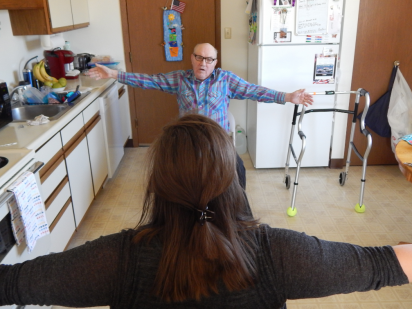The National Institute on Aging described Parkinson’s disease as a brain disorder “that leads to shaking, stiffness, and difficulty with walking, balance, and coordination.”
“From a therapy standpoint and what we see with patients, Parkinson’s is a neurological disease that can cause motor dysfunction,” explained Samantha Mead, OTR/L, an occupational therapist with Trinity Home Health.
Parkinson’s disease occurs when nerve cells in the area of the brain that controls movement become impaired or die. (The cause for this is still a mystery to scientists.) These cells normally produce dopamine; less dopamine causes the movement problems of Parkinson’s.
“With Parkinson’s disease, the main treatment right now is medication to raise the dopamine levels to change the movement,” Mead said.
According to the Michael J. Fox Foundation for Parkinson’s Research, Parkinson’s disease affects one in 100 people over the age of 60. “While the average age at onset is 60, some people are diagnosed at 40 or younger,” the foundation wrote on its website. (Michael J. Fox was diagnosed with Parkinson’s in 1991, at the age of 29, but did not disclose his condition to the public until 1998.)
“The majority of patients I have seen do fall within that 60 and above age range, but certainly it can happen earlier,” Mead said.
Signs and symptoms for Parkinson’s disease vary by the person, with early signs being mild or unnoticed, Mayo Clinic said. Symptoms, which often begin on one side of the body and usually remain worse on that side, include:
• Tremor in hands, arms, legs, jaw, or head. A tremor, or shaking, usually begins in a limb, often your hand or fingers. You may rub your thumb and forefinger back-and-forth, known as a pull-rolling tremor. Your hand may tremor when it’s at rest.
• Slowed movement (bradykinesia). Over time, Parkinson’s disease may slow your movement, making simple tasks difficult and time-consuming. Your steps may become shorter when you walk. It may be difficult to get out of a chair. You may drag your feet as you try to walk.
• Rigid muscles. Muscle stiffness may occur in any part of your body. The stiff muscles can be painful and limit your range of motion.
• Impaired posture and balance. Your posture may become stooped, or you may have balance problems as a result of Parkinson’s disease.
• Loss of automatic movements. You may have a decreased ability to perform unconscious movements, including blinking, smiling, or swinging your arms when you walk.
• Speech changes. You may speak softly, quickly, slur, or hesitate before talking. Your speech may be more of a monotone rather than with the usual inflections.
• Writing changes. It may become hard to write, and your writing may appear small.
LSVT BIG, a physical therapy program designed for patients with Parkinson’s disease, can help patients use their body to regain functional movements. Through the program, patients learn to make large exaggerated movements so that when that message goes from the brain to the feet or hands, the movement comes out a little bit more like before they were diagnosed with Parkinson’s, Mead said. “It evens it out.”
The therapy is “an intense exercise program designed with functional movements that you do repetitively. It encourages large, but controlled movement.” An occupational or physical therapist has hour-long sessions with a patient, four times a week for four weeks.
(While the program is frequently done in outpatient facilities, as a member of Trinity Home Health, Mead does the program with the patient in their home.)
Mead said she has seen “pretty dramatic results” with the patients she has worked with so far. This includes Daniel Depute, of Minot, who began his LSVT BIG training in April.
Four times a week, Mead traveled to his apartment in southwest Minot, where they would do the exercises on the linoleum of his kitchen floor. It started off with him seated in a chair, doing stretches.
“A nice big stretch,” Mead said encouragingly.
By Depute’s last therapy session with Mead in early May, he was leading her in the exercises. Depute, who was diagnosed with Parkinson’s disease, had tried physical therapy before. However, LSVT BIG seemed to make an impact. His movements are better, and he has been doing “very good” since he began therapy, he said.
Trinity Home Health is based at Town & Country Center, Suite 306, 1015 S Broadway, Minot. For more information, call 701-857-5082.

